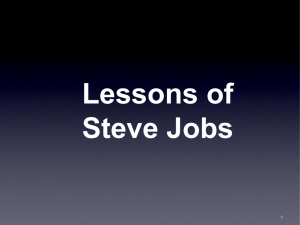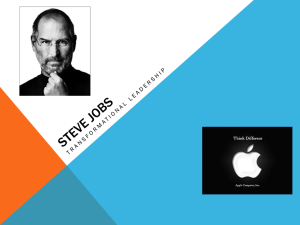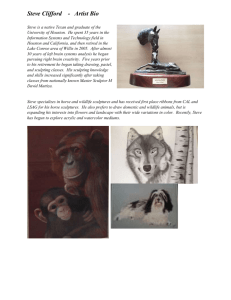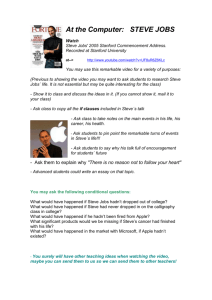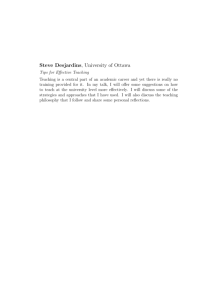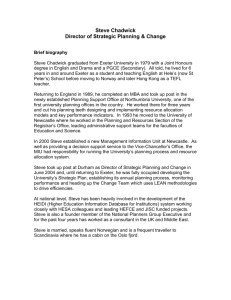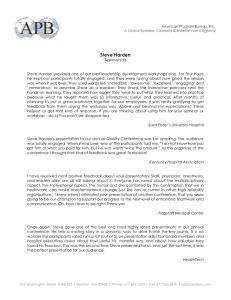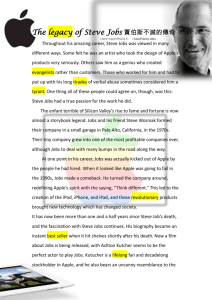Steve Jobs - English 102 - Professor Chocos
advertisement
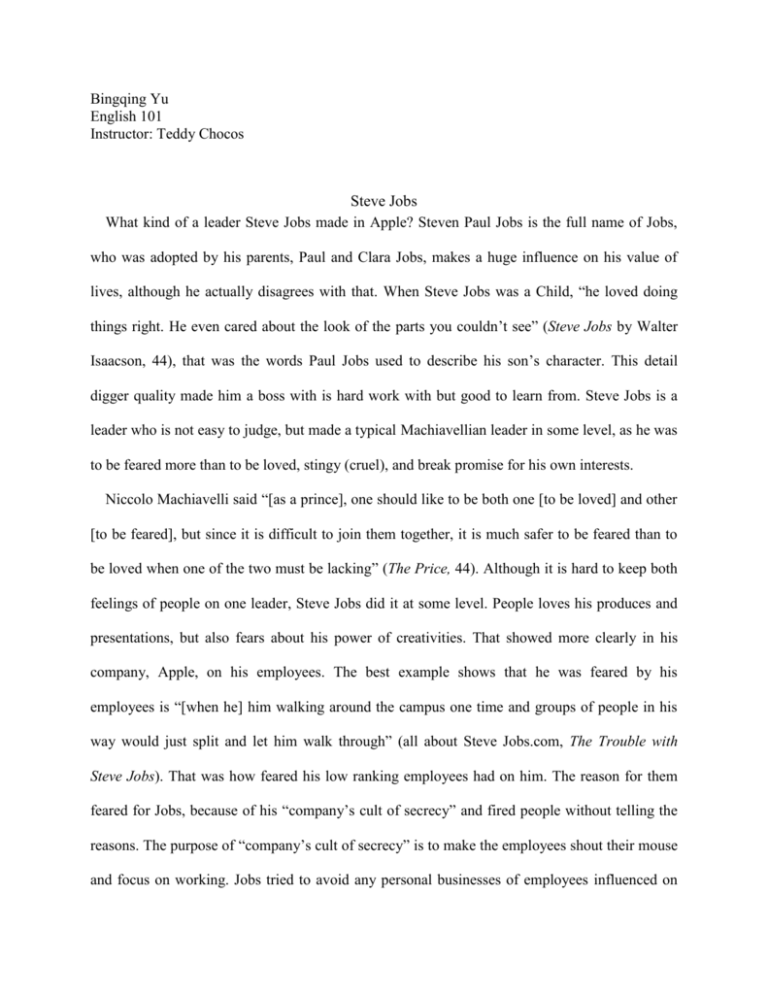
Bingqing Yu English 101 Instructor: Teddy Chocos Steve Jobs What kind of a leader Steve Jobs made in Apple? Steven Paul Jobs is the full name of Jobs, who was adopted by his parents, Paul and Clara Jobs, makes a huge influence on his value of lives, although he actually disagrees with that. When Steve Jobs was a Child, “he loved doing things right. He even cared about the look of the parts you couldn’t see” (Steve Jobs by Walter Isaacson, 44), that was the words Paul Jobs used to describe his son’s character. This detail digger quality made him a boss with is hard work with but good to learn from. Steve Jobs is a leader who is not easy to judge, but made a typical Machiavellian leader in some level, as he was to be feared more than to be loved, stingy (cruel), and break promise for his own interests. Niccolo Machiavelli said “[as a prince], one should like to be both one [to be loved] and other [to be feared], but since it is difficult to join them together, it is much safer to be feared than to be loved when one of the two must be lacking” (The Price, 44). Although it is hard to keep both feelings of people on one leader, Steve Jobs did it at some level. People loves his produces and presentations, but also fears about his power of creativities. That showed more clearly in his company, Apple, on his employees. The best example shows that he was feared by his employees is “[when he] him walking around the campus one time and groups of people in his way would just split and let him walk through” (all about Steve Jobs.com, The Trouble with Steve Jobs). That was how feared his low ranking employees had on him. The reason for them feared for Jobs, because of his “company’s cult of secrecy” and fired people without telling the reasons. The purpose of “company’s cult of secrecy” is to make the employees shout their mouse and focus on working. Jobs tried to avoid any personal businesses of employees influenced on their works and any rumors about any projects they were working on become “well-known” by the masses or any co-companies. He even putted a poster on his desk said “Loose lips might sink ships” (The Trouble with Steve Jobs). Jobs was extremely straight about the rule which was in some points very cruel to his employees, because they could not have any personal emotions on their works, is ridiculous hard for some people. They result for employees did not reach the lines of him, was fire. In some cases, this was hard to understand. For instance, “[Jobs] fired an assistant for bought his a wrong brand of mineral water” (The Trouble with Steve Jobs). Who is really cares about that detail, that brand of mineral water; meanwhile, although it could be a point to judge a person’s characters, it is not enough for fire an employee, for most of the managers. One of the most popular sentences in Apple around employees was that “you can do whatever you want on your last day at Apple” (The Trouble with Steve Jobs). Steve Jobs was loved by people because of his creativity and charms. He was the kind of person who can be as charm as people want he should be. When Jobs did presentations about his new produces, he used the beautiful words and the charismatic voice performs his produces to the masses. That could be the most attractive moments of him in the public which made people love him. (Machiavellian Tint of Steve Jobs, part 1). As it was told on the first paragraph in this essay, Jobs was a detail digger who pursued everything could be as perfect as possible. At this point, Jobs was “miserliness” in Machiavelli’s word, which is also his suggestion for being a prince. As Machiavelli said if a prince himself dose not mind to be called a “miser”, there are lots of advantages for being a “miser” (41). In Jobs’ case, by picking small mistakes and did not let it go easily, Jobs got a group of excellent employees, and Apple is well-known by its excellent qualities. No one has doubted the employees in Apple are not one of the top groups in the industry, not as people known about. As a friend lost her iPhone in the snow-covered ground for 4 days, and when she finally found it, that iPhone was still working as usual shows how great quality iPhone has. Those are related to Jobs “stingy” and “miserliness” closely. Another quality Jobs had also shows his “Miserliness” was his lack of good comments to his employees. One of his close friend said Jobs did not give credit where due, and he often reacted ad hominem (The trouble with Steve Jobs). In the texts called Machiavellian Tint Of Steve Jobs, Part 1, it proved an quote of Steve Jobs’ own words“I skate to where the puck is going to be, not where it has been, and we’ve always tried to do that at Apple. Since the very beginning. And we always will”. It shows how tough Jobs was on his rules of employees and company. Because of that believes, he kept his eyes on employees mistakes more than their excellent performances. Those qualities which are hard to take for most of people are the parts of Jobs’ “miserliness”, as he was careful with his works like Machiavelli suggested that “in order…to be able to defend himself…a price must consider it of little importance if he incurs the name of miser” (The Prince, 42).if it is necessary to be “miser”, then be one. The last point of Jobs was a leader suitable for Machiavelli’s opinions of being a “prince” is Jobs was not a leader who kept promises or appointments when those were barriers of his way to his passion. Jobs was a person who focused on his passion, and could do everything for that (Steve Jobs7 rules of Success). In Machiavelli’s view, the quality of break promises when it is useful for a prince is a good part of a prince, because it has benefits for that (46). However, this quality made Jobs co-operate partners hated him and broke few of his important business relationships. For instance, “He fired Raskin after he learned about the note”(The Trouble with Steve Jobs), he should not fire someone after he totally used of them morally, it is a promise to the people he hired and he broke their trusts at some points. Those disadvantages caused by breaking promises for Steve Jobs, could due to he was misunderstanding of Machiavelli’s point of when it better than keeping the promises, but it shows there are negative benefits on Machiavelli’s views on the qualities a prince should have. Steve Jobs was a complex man to judge as he is “a controversial character” (The Trouble with Steve Jos), who had very contradictious personal performances assume that he could be charming and cruel at the same time. As a leader, he did not follow the traditional rules of management, and became a Machiavellian style’s leader in his own way.
